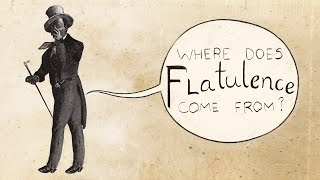(单词翻译:单击)
Flatulence, or passing gas, is a normal daily phenomenon.
胀气,或者放屁,是正常的日常现象。
Most individuals, yes, that includes you, will make anywhere from 500-1500 milliliters of gas
大多数人,是的,这包括你,每天将会产生500-1500毫升的气体
and can pass gas ten to twenty times a day.
并且每天会放十次到二十次的屁。
But where does this bodily gas come from?
但是身体里的气体从哪里产生的呢?
A small proportion may come from ingesting air during sleep, or at other times,
小部分的气体可能来自于在睡眠或其他时间吞入的空气,
but the majority of gas is produced by bacteria in our intestines as they digest parts of food which we cannot.
但是大部分的气体,是由我们肠道里的细菌产生的,因为他们可以消化部分我们无法消化的食物。
Our intestine is home to trillions of bacteria living in a symbiotic relationship with us.
我们的肠道里住着上亿万的细菌,它们和我们是共生的关系。
We provide them with a safe place to stay and food to eat.
我们为他们提供了安全的居住环境和吃的东西。
In exchange, they help us extract energy from our food, make vitamins for us, like vitamin B and K,
作为交换,他们帮助我们从食物中提取能量,为我们制造维他命,例如维生素B和维生素K,
boost our immune system, and play an important role in gastrointestinal barrier function,
增强我们的免疫系统,并在肠屏障功能,
motility and the development of various organ systems.
胃肠运动及各器官系统的发展中发挥重要作用。
Clearly, it's in our best interest to keep these bacteria happy.
如此可见,我们最好让这些细菌快乐的生活下去。
Gut bacteria get their nutrition primarily from undigested food,
肠道细菌主要从未消化的食物里取得营养,
such as carbohydrates and proteins, which come to the large intestine.
像到大肠里的碳水化合物和蛋白质,
They ferment this undigested food to produce a wide range of compounds, such as short-chain fatty acids and, of course, gases.
他们将未消化的食物发酵从而产生一系列的化合物,例如:短链脂肪酸,当然,还有气体。
Hydrogen and carbon dioxide are the most common gaseous products of bacterial fermentation, and are odorless.
氢和二氧化碳是最常见的细菌发酵的气体产物,并且他们是无味的。
Some people also produce methane due to specific microbes present in their gut.
由于有些人肠胃里有某种特定的微生物,他们还会产生甲烷。
But methane is actually odorless, too. Well then, what stinks?
但是甲烷也是无味的。那么,什么东西这么臭?
The foul smell is usually due to volatile sulfur compounds, such as hydrogen sulfide and methanethiol, or methyl mercaptan.
臭味一般是因为有挥发性的硫化物,如硫化氢和甲硫醇,或巯基甲烷。
These gases, however, constitute less than 1% of volume, and are often seen with ingestion of amino acids containing sulfur,
但是,这些气体只占总量的1%,并且经常因为我们摄入含硫氨基酸,
which may explain the foul smell of gas from certain high protein diets.
这可能解释了臭气是从某种高蛋白饮食中来的。
Increased passage of gas is commonly noticed after eating foods with high amounts of indigestible carbohydrates,
常常在吃了含有大量不易消化的碳水化合物的食物后,会产生更多的气体,
like beans, lentils, dairy products, onions, garlic, leeks, radishes,
如豆类,扁豆,乳制品,洋葱,大蒜,韭葱,萝卜,
potatoes, oats, wheat, cauliflower, broccoli, cabbage, and brussel sprouts.
马铃薯,燕麦,小麦,菜花,西兰花,白菜及甘蓝。
Humans lack the enzymes, so the bacteria able to ferment complex carbohydrates take over,
人体缺乏酶,因此那些能发酵复合碳水化合物的细菌就派上用场了,
and this naturally leads to more gas than usual.
这就会产生比平常更多的气体。

But if you feel uncomfortable, bloated or visibly distended,
但是,如果你觉得不舒服,浮肿或明显肿胀,
this may indicate impaired movement of gas along the gastrointestinal track.
这可能表明沿着胃肠道运动的气体遇到了障碍。
It's important not to just blame certain foods for gas and bloating and then avoid them.
我们不能因为涨肚就归咎于某些食物然后就不吃它们。
You don't want to starve the bacteria that digest these complex carbohydrates,
你不会想饿着这些消化复杂碳水化合物的细菌,
or they'll have to start eating the sugars in the mucus lining of your intestines.
否则它们就会开始消化肠道粘膜里的糖。
Your personal gas will vary based on what you eat, and what bacteria are in your gut.
你身体里产生的气体取决于你吃了什么以及你肠胃里的细菌种类。
For example, from the same starting sugar, the bacteria clostridium produces carbon dioxide, butyrate and hydrogen,
例如,同样是糖,梭状芽孢杆菌会产生二氧化碳,丁酸盐和氢气,
while propionibacterium can produce carbon dioxide, propionate and acetate.
然而丙酸杆菌可以产生二氧化碳,丙酸和乙酸。
At the same time, methanogens can use hydrogen and carbon dioxide produced by other bacteria to generate methane,
同时,产甲烷菌可以使用其他细菌产出的氢和二氧化碳以生成甲烷,
which can reduce the total volume of gas by using up hydrogen and carbon dioxide.
通过耗掉氢气和二氧化碳来减少气体的总量。
So there's a complex web among intestinal bacteria allowing them to flourish by either directly consuming undigested food,
因此,肠道细菌形成了一个复杂的网络,它们可以直接消耗未消化的食物
or using what other bacteria produce.
或者消耗其他细菌生产出来的东西。
This interaction largely determines the amount and type of gas produced,
这种相互作用在很大程度上决定了气体所产生的量和类型,
so gas production is a sign that your gut bacteria are at work.
因此,产气表明你的肠道细菌在起作用。
But in some instances, people may develop abnormal increased flatulence.
但是在某些情况下,人们可能会产生异常的胃肠胀气。
A common example is lactose intolerance.
一个常见的例子是乳糖不耐症。
Most individuals have the enzyme for breaking down lactose, a sugar present in milk and milk-derived products.
大多数人都有分解乳糖的酶,乳糖是一种在牛奶或奶制品里存在的糖。
But some people either lack it entirely, or have a reduced amount, such as after a gastrointestinal infection,
但是有些人可能就没有这种酶,或者有但是数量不够,如胃肠感染后,
so they're unable to digest lactose products and may experience cramping,
所以他们无法消化乳糖的产品并可能腹部绞痛,
along with increased flatulence due to bacterial fermentation.
同时伴随着由于细菌发酵而导致的胀气。
But remember, most gas is produced as a natural result of bacterial fermentation in the intestine,
但是记住,大部分气体都是由肠胃里的细菌自然发酵的,
and indicates healthy functioning of the gut.
这表明肠胃正常工作。
The amount and type can vary based on your diet and the bacteria in your intestine.
气体的数量和类型会因为你的饮食和肠道内的细菌种类而有所不同。
Exercise social courtesy while passing gas, and do try to forgive your bacteria.
放屁时也要娴习礼仪并试着原谅你的细菌。
They're only trying to be helpful.
他们也只是想帮帮忙。


